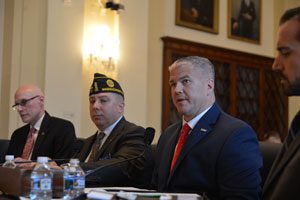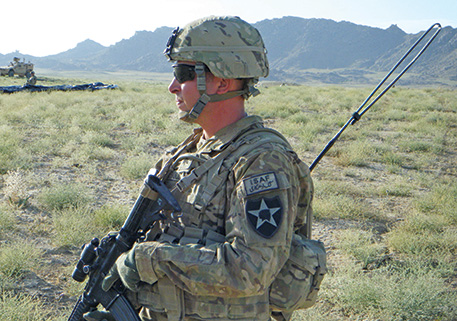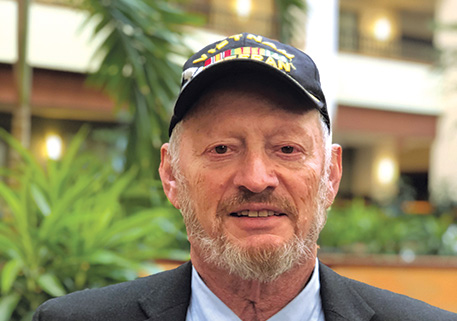 In the last session of Congress, appeals reform legislation was introduced but not passed; now the Veterans Appeals Improvement and Modernization Act of 2017 has cleared critical hurdles in both the House and Senate and is well on its way to overhauling the current process for veterans’ appeals at the Department of Veterans Affairs.
In the last session of Congress, appeals reform legislation was introduced but not passed; now the Veterans Appeals Improvement and Modernization Act of 2017 has cleared critical hurdles in both the House and Senate and is well on its way to overhauling the current process for veterans’ appeals at the Department of Veterans Affairs.
The bipartisan legislation was reintroduced and approved by the House in May, passed by the Senate Committee on Veterans’ Affairs in June and is expected to be approved by the full Senate before the August recess.
“It is critical that we address the unacceptable delays that veterans and their families face during the VA’s disability claims appeal process,” said committee chairman Sen. Johnny Isakson, who introduced the legislation with Sen. Richard Blumenthal. “We worked with the VA and veterans groups to put forth this bipartisan legislation that overhauls the current appeals process and puts in place a new system that allows veterans to choose the option that is right for them. I am pleased that my colleagues in the committee have made appeals modernization at the VA a priority. I hope the Senate will quickly take up and pass this critical legislation to help ensure veterans are served in a timely and efficient manner.”
On average, an appeal today takes between three and five years, sometimes longer, to complete. There are currently more than 450,000 appeals pending, roughly 370,000 within the Veterans Benefits Administration’s (VBA) jurisdiction and another 80,000 within the jurisdiction of the Board of Veterans’ Appeals. The number of pending appeals increased from fiscal year 2015 to 2017 by more than 20 percent.
The rising appeals backlog is partly due to more claims processing—almost 1.4 million this year—by the VBA and partly due to a lack of resources, technology and modern processes at the Board.
“It was becoming clear that as we began to eliminate the backlog of claims, an equally troubling backlog of appeals was growing,” said DAV National Service Director Jim Marszalek. “With appeals of claims remaining steady at a 10 percent rate, the undermanned and outdated appeals system was unable to keep pace.”
After legislation stalled in both the House and Senate last year, DAV worked with VBA, the Board and Congress to reintroduce an enhanced version of the legislation which is now moving towards final passage.
Marszalek, who was a key player in the stakeholder workgroup that drew up the new appeals framework last year, testified before the House Veterans’ Affairs Committee in May ahead of the bill’s unanimous approval in the House.
“The critical core of the new appeals system provides veterans with multiple options to challenge unfavorable decisions, introduce new evidence at both VBA and the Board, and protect their earliest effective dates,” said Marszalek. “[I’m] confident that [the] legislation, with the additional improvements recommended by DAV and others, could provide veterans with quicker and often more favorable outcomes, while fully protecting their due process rights.”
The Veterans Appeals Improvement and Modernization Act of 2017 would overhaul the VA’s current appeals process and includes safeguards to help ensure that veterans, their families and their survivors are better served by the VA’s appeals system. It would enable veterans to choose from three separate paths when seeking redress from a decision by VBA on their claims:
- Seek a higher-level review by a regional office on the same evidence presented to the original claims processors;
- File a supplemental claim with a regional office that would include the opportunity to submit additional evidence; or
- Appeal directly to the Board of Veterans’ Appeals, resulting in a possible hearing and/or the opportunity to submit additional evidence.
Veterans who remain unsatisfied with their decisions can elect to continue their appeals via one of the other options, while continuing to protect their earliest effective date for benefits. The bill also requires VA to provide a comprehensive plan for both implementing the new system as well as to complete the processing of existing legacy appeals.
“The current appeals process for veterans’ benefits is a quagmire that fails veterans and their families. Without reform, thousands of our nation’s veterans will continue to languish for years without receiving a fair and just consideration of their appeal, and [will be] denied access to the benefits they need and deserve,” Blumenthal said. “With this kind of bipartisan consensus, I am hopeful that we can send an appeals reform bill to the President’s desk this year.”






